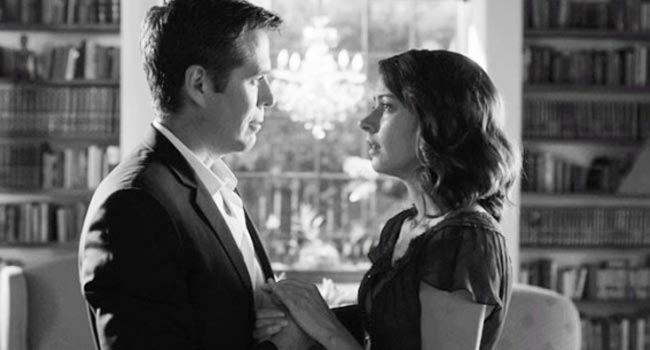
The beauty of Whedon’s adaptation is that it respects the genius of the original work.

The beauty of Whedon’s adaptation is that it respects the genius of the original work.
For fun, Joss Whedon likes to hold late-night drunken Shakespeare readings with his friends at his Los Angeles home (because who doesn’t?). Much Ado About Nothing, his adaptation of Shakespeare’s (arguably) best comedy, is an elaborately staged movie version of the wine-soaked bard parties. This is Whedon’s vacation from the superheroes, literally—on downtime during filming The Avengers, when he was supposed to be on vacation, Whedon gathered his merry troupe of actor friends from the Whedonverse (Buffy, Angel, Firefly, Dollhouse) and shot Much Ado About Nothing in 12 days (at his house, appropriately). Do the booze-fueled get-togethers translate well to the big screen? They sure do, thanks to the agile tongues and keen intelligence of Whedon and his chums.
The beauty of Whedon’s adaptation is that it respects the genius of the original work. Whedon takes the opposite approach of Baz Luhrmann’s flashy, over-stylized Romeo+Juliet—he trusts the power of the source material and is wise enough to not let unnecessary modern flourishes and bells and whistles obstruct Shakespeare’s work. This is a gracious, glitzy firecracker of a film that would make Ol’ Willie proud.
Though Whedon has trimmed a good amount of story off of the play, the original themes—about the many faces of love and the value of honor—remain intact. The plot is dizzying, but Whedon does a good job of making the scenes so entertaining that you dial in to each one, never missing a beat. From beginning to end, the film feels like a never-ending party, with bottles popping incessantly and sharp suits and cocktail dresses filling the screen. The film was shot in black and white, which lends itself well to the modern setting as it makes the house and everyone in it look more elegant and effervescent.
Alexis Denisof and Amy Acker play the timeless romance of Benedick and Beatrice like superstars, making the most of every moment (why these two haven’t had more successful film careers, I’ll never know). Their crackling chemistry (which had been developed over years on Angel) is as scrumptious as anything you’ll see this year. When Denisof tries to impress Acker by doing a cartoonish calisthenics routine in front of her while they have a casual conversation, it’s funny in the most unpretentious way, a nice palette-cleanser to the mean-spirited, sarcastic form of comedy seen in recent years. Denisof and Acker slip in and out of high drama and goofball comedy seamlessly, which is a skill the material requires. One minute they can’t stand the sight of each other, barking and verbally stabbing. The next, they’re declaring their undying love and rubbing noses. It’s all charming, all fluid, all convincing.

Though every cast member gets their moment in the sun, Franz Kranz is a standout as the animated, love-drunk Claudio. He’s given the most emotionally intense scenes in the film, and he brings energy to them that are off-the-charts. Though much less experienced in terms of theater time, Nathan Fillion provides the biggest laughs as the self-involved Chief-of-Police, Dogberry. He sings Shakespeare’s lines with a smirk and a curled eyebrow. “Remember that I am an ass. Though it not be written down, yet forget not that I am an ass.”
The modern Los Angeles setting is occasionally incompatible with the centuries-old dialog—hearing grand Elizabethan speech delivered in front of a refrigerator can be a little hard to swallow. The most difficult scene to digest is late in the film—Hero (Jillian Margese) is left at the altar by Claudio when he accuses her of squandering her virginity on another man. A pack of men then proceed to shout shockingly misogynistic insults at her, slinging their hate-filled scorn until she is so shamed she collapses. It’s hard to completely buy that this would fly in our time, though it ultimately doesn’t affect the drama of the scene significantly.
Much Ado About Nothing is light, good-humored fun. It’s sparkly and summery and full of laughs, though the modern setting doesn’t gel with the Elizabethan material quite as well as I’d hoped. The results are almost always delightful when Whedon works with his mates, and this outing is no exception. If Shakespeare were here to see it, he’d likely be pleased. “Twas a joyful romp, lord Whedon. But what, pray tell, is a ‘Buffy’?”